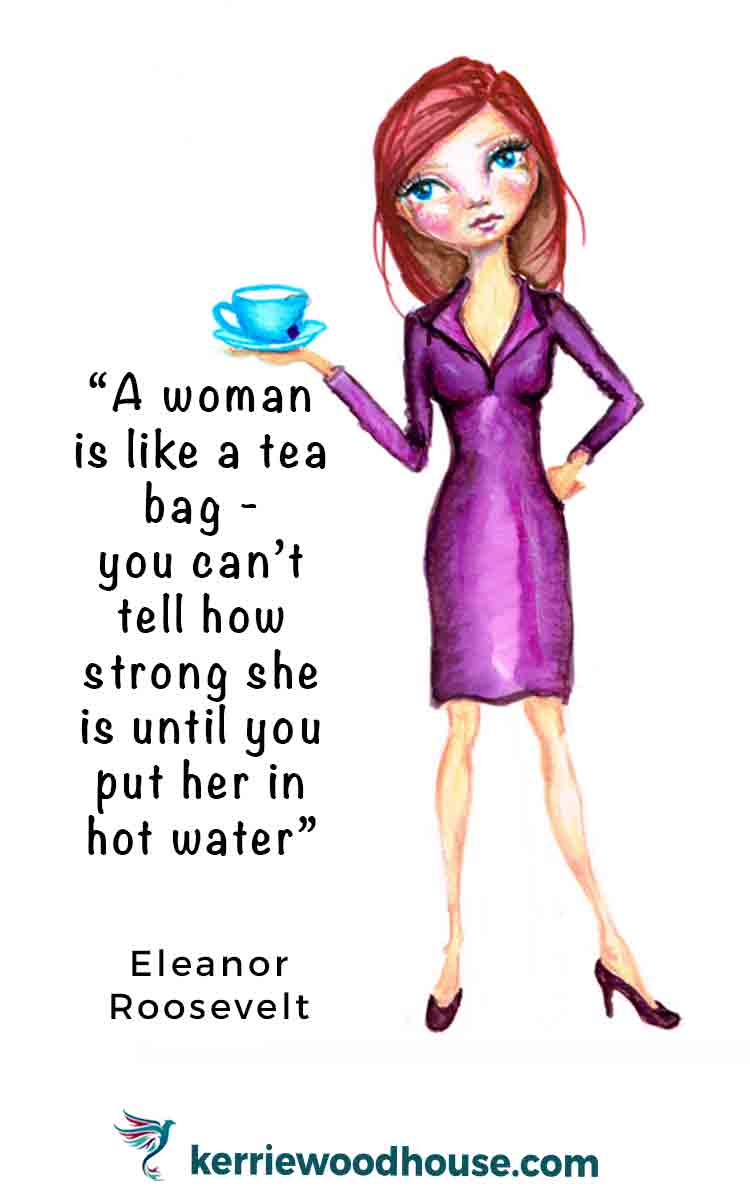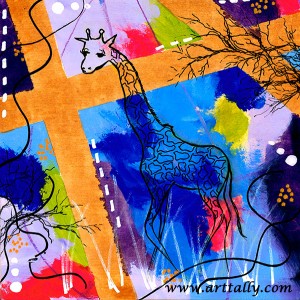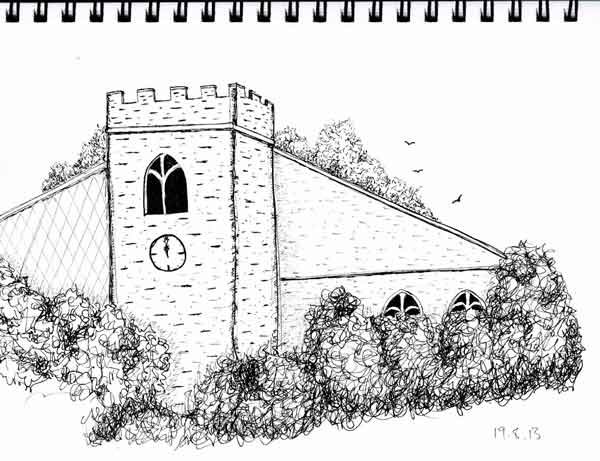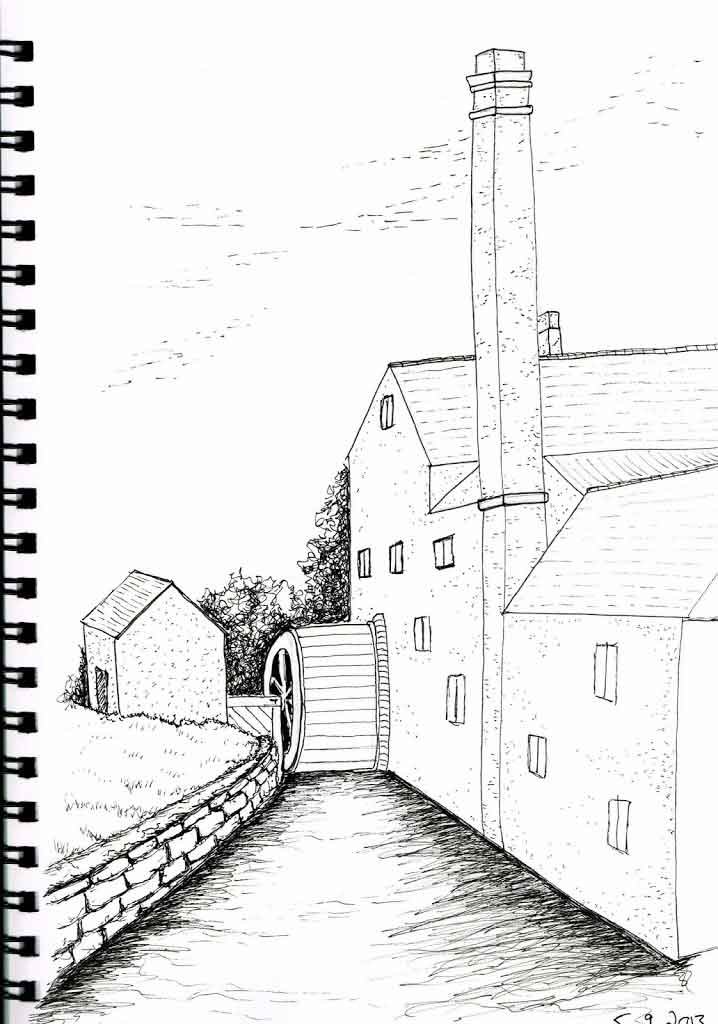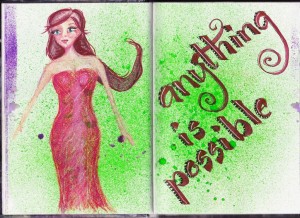Is a woman like a tea bag?
When I first read this quote - apparently from Eleanor Roosevelt... I loved it. Then I thought about it a bit more.... Is a woman like a tea bag? Hmmm ... do I really want to be compared to a tea bag? Not sure about that, thanks, Eleanor!
This quotation is often attributed to Eleanor Roosevelt but without citing which original writing it actually came from. Then others attribute a very similar quotation to Nancy Reagan:
"A woman is like a teabag — only in hot water do you realize how strong she is." - Nancy Reagan The Observer (29 March 1981)
Well yes, Ladies. We are definitely strong - I'll give you that. And I appreciate the sentiment although I would prefer to be compared to something more shapely and less disposable, to be honest.
Although, Eleanor Roosevelt often gets the credit for the remark it has apparently been around for many years. Or at least variants of the saying. The Quote Investigator believes that in the 19th century similar adages featuring eggs and potatoes and hot water were evident in Irish papers.
I guess it is something we have known for a long time, which applies to all of us - not just the women.
We don't necessarily realise how strong we are until we are tested.
Explore more of the tea time post series here
See the kitchen inspired artwork available in the shop
Use your artist's eyes to find a little more daily happiness
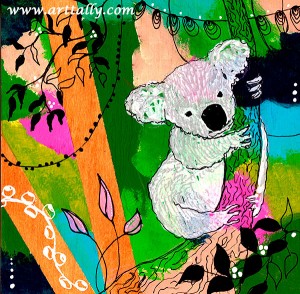 It is a privilege to be able to see the world through artist's eyes. The same privilege as it is to see the world through the eyes of a child. Have you ever taken a walk with a three year old? In 100m there will be a surprising amount of fascinating diversions. Every ant, shadow and unusual shaped leaf can absorb and entertain a child. We probably don’t even notice these things.
It is a privilege to be able to see the world through artist's eyes. The same privilege as it is to see the world through the eyes of a child. Have you ever taken a walk with a three year old? In 100m there will be a surprising amount of fascinating diversions. Every ant, shadow and unusual shaped leaf can absorb and entertain a child. We probably don’t even notice these things.
But if you are open to it, as we all are as children, there is awe and beauty in every dewdrop balanced on a leaf tip, the shafts of new light through the trees, the contrast of red and gold autumnal leaves against a perfect blue sky.
Finding the joy in these things is the path to a little more happiness in every day. Far more so than in the ‘big’ things, like winning the lottery or getting that promotion.
If you want to reawaken that child-like awe, the easiest way to do it so to draw something. You don't need to draw well, you just need to practice using your artist's eyes. And yes, we do all have artist's eyes, whether you believe it or not.
Drawing is 90% looking and 10% drawing. It requires the abandonment of judgement and preconception. You know that the your teacup is round but right now, from this angle, the rim actually looks like an oval. You know mountains don’t really have blue grass but right now those mountains do indeed look blue .
Being required to see things just as they appear rather than how you think they are supposed to be, forces you to really notice your world. If you draw and paint regularly you start to see the world in all its glory again. The shadow pattern made on the carpet by the light from the window can somehow enthrall. The arrangement of a throw, a pillow and book tossed on your chair in the living room delights. Maybe it's the composition. Maybe it is the marriage of colours - quite coincidental but even more lovely for it. These small things are enough to lift your spirits just that little bit.
In a world that bombards us with a constant stream of usually less than positive news events, the little dose of happy to be found in every part of our environment is just the counterbalance we need.
What will you try today? ...consider Picasso's advice...
"God is really only another artist. He invented the giraffe, the elephant and the cat. He has no real style, He just goes on trying other things." Pablo Picasso.
Excellent point, Picasso.
Let's let go of norm and expectation and try new, different things.
Play. Experiment.
This is good advice if you are an artist worrying about finding your style.
But really, it is good advice for all of us, in our daily lives. Life presents us with a veritable smorgasbord of opportunities. It would be a shame to miss out by not trying whatever we can. Sticking only to what we know deprives us of the chance to discover new joys.
What will you try today?
How to feel calmer in one minute
Here we are at monkey number 4. It always feels rather good to get to the end of a complete series. This little monkey is sitting quietly noticing the world around her. We all need to do that too. Being busy is easy. It feels inevitable somehow. Remembering to take a little time out and sit for a moment.... that is much harder. But so important.
I think we are probably all aware of how valuable meditation is, but how many of us have managed to make this a habit?
For many of us the excuse is time. Somehow finding time in the day to sit and essentially 'do nothing' seems impossible and even counterproductive if you schedule is stretched already. The other excuse is that it is too hard, it takes too long to learn, that you are too restless and can't quieten your thoughts.
How much easier would your life be in you knew how to feel calmer in one minute?
Because one minute is actually all you need.
Even one minute of sitting quietly can make you feel significantly better. Whether it is a little anxiety, a little frustration, overwhelm, or tiredness, you might just be surprised at the difference a minute can make. Try it and see... its worth a shot. Here is a little video that explains it all and gives you a chance to try it now for yourself. And there is a free app you can download called One Minute Meditation.
I love the idea of taking one minute to reset. No yoga mat, no meditation cushion. But I do rather like having a bit of help. By which I mean that while a moment of silence is immensely valuable, there are times when I like to have some more specific audio guidance.
If you do too, you might appreciate the free resources available at just-a-minute.org. There are a series of one minute meditations available that cover all sorts of things such as visualisation, relaxation and concentration. They even have one minute meditations for kids. All these meditations are available free either to stream or download.
And may you have a calmer day because of it.
Play! Every day.... yes, even if you are an adult
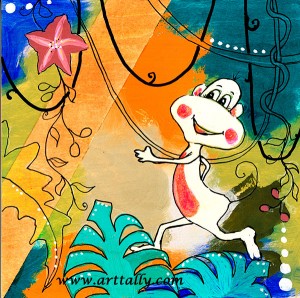 Play! Every day..... yes, even if you are an adult... in fact, especially if you are an adult. Children don't need to be told to play, but sadly, we adults do seem to need telling.
Play! Every day..... yes, even if you are an adult... in fact, especially if you are an adult. Children don't need to be told to play, but sadly, we adults do seem to need telling.
The Importance of Playing
One of the reasons I love to draw and paint is that for me it is play. And play is so important, for adults as well as children. Playfulness certainly influences my choice of subject matter. Just like these little guys. These monkeys remind me to play. They represent fun - something I choose to look for in each and every day.
There are so many reasons adults should be playing. Even playing video games can improve your quality of life and actually (contrary to what we may believe) it can make us more imaginative and improve our social skills. Playing reduces stress, increases our opportunities to bond with others who share our playful interests, and gives us something to look forward to.
Fave Quotations
I'd like to share some wise words (not mine!). These are some of my favourite quotations on the subject.
- "In every real man a child is hidden that wants to play." Frederic Nietsche
- "It is a happy talent to know how to play." Ralph Waldo Emmerson
- "A person's maturity consists in having found again the seriousness one had as a child, at play." Frederic Nietsche
- "Whoever wants to understand much must play much." Gottfried Benn.
- "Play is the highest form of research." Albert Einstein.
- "The creation of something new is not accomplished by the intellect but by the play instinct." Carl Jung.
- "You've achieved success in your field when you don't know whether what you are doing is work or play." Warren Beatty
- "You can discover more about a person in an hour of play than in a year of conversation." Plato
Why parenting teaches entrepreneurs about unstructured time and self discipline
Becoming an entrepreneur can be as overwhelming as becoming a new parent
Parenting teaches entrepreneurs about unstructured time and self discipline. A new parent is dispatched home with a sweet smelling bundle of joy, only to find themselves stepping into a sort of parallel universe. Day and night blur exhaustingly into one. Time loses its meaning. Day to day tasks that were once second nature like regular meals, doing laundry and managing to wear matching shoes become challenging.
That blur of overwhelm is very similar to the experience of the newly self employed. In fact, any significant life change that removes the structure of your day like children going to school or leaving home, being made redundant or retiring, can leave you with an an unsettling amount of unstructured time.
Unstructured time is not as brilliant as you might have hoped…
If you chose the change, unstructured time might be exactly what you were after. But sometimes it is not all you had hoped it would be. Studies have linked the increase in unstructured time experienced by those who are unemployed to low self esteem, hopelessness and inactivity . With too much time on our hands we end up having to face our demons. And with unstructured time the most likely outcome is often a significant lack of productivity.
Hopefully you find a creative endeavour to utilise this time. If the change was of your choosing, as in the case of the new entrepreneur this creative project might be the very reason for the change. You start a business, change career, write a novel, take up a hobby. That creative project is your new baby.
However, unlike the newborn baby your new project won't wail to let you know when you have missed an important activity like time for a feed or a nappy change. No, your new project is entirely silent. It is all on you to figure out what to do and when to do it.
Reduce that overwhelm with a solid structure
Most new parents learn pretty fast that the best way to manage this enormous life change is with a steady routine. That fuzzy haze of the first few days or weeks clears once a consistent schedule is established. And with a newborn baby, there are usually plenty of knowledgeable friends and relatives, who are more than willing to provide input.
Similarly, to thrive (or just survive) your new creative endeavour you have to manage that unstructured time with… yes, I’m afraid so… a bit of structure. It might be that unstructured time is what you wanted, but actually it is more like self-directed time. Maybe what you wanted was not to be answerable to anyone - unstructured time is the initial side effect.
Okay, so there are no busybody relatives and parenting gurus clamouring to be involved in what you do. But resources are readily available to help you come up with a structure. They are all largely common sense, as most good advice is. They likely begin with an assessment of goals and objectives. The next step is to break down the steps needed to achieve those goals and objectives. And finally, to schedule those priority tasks.
The key to success is self discipline
However, scheduling is not the final step at all. I think that this part is comparatively easy compared to the critical final component. Execution. Actually carrying out the tasks that have been scheduled. A crying baby is hard to ignore. You complete the necessary tasks without really thinking about it because the need, goals and objectives are obvious and time is scarce.
But with the new creative endeavour, it is easy to lose sight of the goals, and to lose the sense of urgency. The only thing that keeps us executing the tasks on our list is self discipline.
Business gurus like Bob Proctor and Brian Tracy advise that self-discipline is the most important characteristic of an entrepreneur. Often, the most productive time of our life is our school days. Thanks to a rigorously enforced and carefully thought out structure, we learn multiple subjects and skills, and include play, exercise and hopefully healthy eating on a daily basis.
Unfortunately, without teachers and parents and bosses we are accountable only to ourselves. With only self discipline to keep us on track we probably won’t achieve the volume and variety of learning and productive activity per day as we did at school. Nor do we always remember to take care of ourselves as well as we should. The most essential tool in our arsenal for success is self discipline.
Fortunately, self discipline is a learned skill. If it doesn't come naturally to you, you can still improve it with some effort.
Schedule out every part of your day. Do this before the day begins - at least the night before. Then follow your schedule unwaveringly, whether you feel like it or not. The sense of achievement when you carry this out is very motivating. Do it again tomorrow. And the next day.
Will you be able to do this every single day? Probably not. Don’t be too hard on yourself. We all have off days. Aim for the 80/20 rule… try and do this at least 8 out of every 10 and see your productivity sky rocket. Your self esteem and mental state will benefit too. Like anything, the more you practice, the easier it becomes.
Why your to do list is overwhelming (and what to do about it)
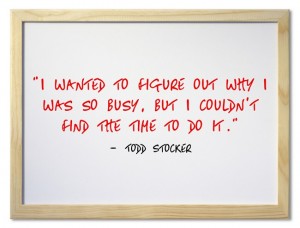 Be honest. How many free books have you downloaded but not yet opened? How many courses have you enrolled in but not completed? How many mailing lists are you signed up to that you don't get around to reading? Have you been promising yourself you would sail around the world one day, but still haven't done that? Planned to write a novel but still haven't got started?
It's not that you are lazy. In fact it's exactly the opposite. So much good intention. So much self improvement. But sadly, there are only so many hours in the day.
Be honest. How many free books have you downloaded but not yet opened? How many courses have you enrolled in but not completed? How many mailing lists are you signed up to that you don't get around to reading? Have you been promising yourself you would sail around the world one day, but still haven't done that? Planned to write a novel but still haven't got started?
It's not that you are lazy. In fact it's exactly the opposite. So much good intention. So much self improvement. But sadly, there are only so many hours in the day.
Our modern world delivers nearly everything we could possibly want, twenty fours of every single day. We see all sorts of opportunities for things we could do and learn and be. This can ignite our passions and fuel us on to explore such exciting possibilities. But just because so much is possible, it doesn't mean we have to do it all. And we certainly don't have to do it all today.
Most of us add an inexhaustive list of things we 'should' do, or things we 'could' do to our list of routine daily activities, like our actual jobs, feeding ourselves, buying that birthday gift for a relative, and so on. No wonder our to do lists feel overwhelming. In part it is because we may not have drawn that distinction between things we must do (like eat dinner) and things we might do (like learning a foreign language, say). So these extra tasks hang over us. They cast just a little shadow at first, and perhaps we don't notice them much, much less recognise what it is that is actually weighing over us. But eventually they become oppressive, especially when they accumulate.
So the first step is to figure out which of the tasks on our list fall into the 'might-do' category. One option is to create a separate list more appropriately titled, so that you can remind yourself that these are aspirational possibilities rather than chores you have still not completed. A second option is a suggestion from Arianna Huffington's new book Thrive. She says you can complete a task simply by crossing it off your list. You don't have to do everything. Really... you don't.
Another reason a to do list is overwhelming is that we are never quite sure we have done enough. We want to exercise regularly, meditate regularly, read more, improve a particular professional skill. We might even have been to enough training seminars to know that we need 'SMART' goals. This may mean we have set ourselves minimums, like 3km of running 3 times per week. Do this for all the tasks on your list and you have given probably set enormous expectations for yourself.
In itself that is not a bad thing, but we have to be fair to ourselves and aware of our current capacity. As James Clear points out, we should only expect that which is sustainable, by setting upper bounds as well as lower bounds. This is a lesson from the corporate world. Southwest Airlines chose to place an upper bound on their company growth in order to give themselves a margin of safety and avoid burning out. It seemed to work for Southwest, and it makes a lot of sense for us too as James Clear explains.
Figuring out how much of an activity is too much for us in a particular day or week, leaves us the space to rest and creates space for the next item on the list. It also may leave us with a better sense of accomplishment.
If your to do list overwhelms you it is a good indication that you need to go back to what is truly important to you. What are you goals and values? Now pick your top 3-5. Make sure every item on your list is in line with one of those 3-5 goals and values - if not cross it out, or at the very least put it on a separate list. Be kind enough to yourself to make sure you do not have unrealistic expectations. Life is too short for that.
“Busyness is not a reason for not getting other things done. It is an excuse for not claiming your true priorities.” Alan Cohen
Can you 'fake it till you make it' and still be authentic?
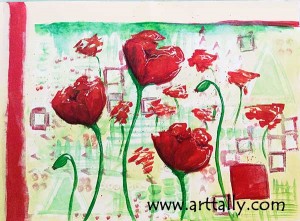 Whether you are reading about management, leadership or personal development, authenticity is one of those ever present buzzwords. We all strive for authenticity. But can being authentic prevent you from growing?
Whether you are reading about management, leadership or personal development, authenticity is one of those ever present buzzwords. We all strive for authenticity. But can being authentic prevent you from growing?
It comes down to what we mean by authentic. For most of us we think of this as having a clear sense of self, and staying true to that self. Making sure that you say as you feel, and do as you say. Your authentic self is your own unique blend of talents and attributes, the qualities that make you, you. It is not your qualifications or the things you think you should believe or be or do.
So what happens if you are trying something new and stepping out of your comfort zone? If you take up a more senior role, or branch out into a new area it seems inevitable that you will have some level of doubt, discomfort and lack of confidence. Don’t you need to ‘fake it till you make it’? Or would that be inauthentic?
If your answer was yes, then it is possible that your rigid view of authenticity could prevent you from growing. INSEAD professor Herminia Ibarra, suggests that the solution is to try and be more ‘adaptively authentic’. If we are too introspective and follow our old narratives too rigidly we are not giving ourselves permission to try anything new. We reinforce our existing stories and beliefs and limit our potential for discovering something different and possibly better.
To discover your authentic self you need to be clear about what it is that you value. Not what you think you should value, but what is actually important to you. Our past achievements are not these values. Hopefully what we have achieved is in line with our values, but these achievements should not become our sense of self. That kind of thinking drastically reduces the chance of further development.
For example, you might know that you are a good employee - you have been one before. You count it as an achievement. Being a good employee is as a result of your acting in accordance with your values of reliability, co-operation, diligence. But it does not mean you are only an employee or that it would be inauthentic to be anything else. Just because you are or have been an employee doesn't mean you can't become say, an entrepreneur. Focus on those values. Being reliable, cooperative and diligent can make you a good entrepreneur too.
Taking on a new role is going to feel uncomfortable - of course. The new entrepreneur is a beginner at being an entrepreneur and we all deserve to be able to give ourselves permission to be a beginner. Your authentic self knows you are a little scared and worried that you don’t really know what you are doing. I don’t think you need to be sharing that with the world to remain authentic. I think you can be aware of being a beginner, and be okay with that. Learn as you go, authenticity intact. There is a time and place to share your doubts. Choose that time wisely. Find a mentor and tell them... not your first client. When you get that promotion to manager don’t reveal your insecurities to your new staff. That’s not authenticity, it's poor management.
Social media shines the spotlight on the whole issue of authenticity. Celebrities and politicians are often under scrutiny for having artificial profiles on social media. But the reality is that we are all complex beings. We are all different things to different people. Do we really need to see every facet of a person in their social media profile… I think not. As long as we are clear on our own values and are acting in accordance with those values, being selective about what we reveal, when we reveal it and to whom is not inauthentic. It's just smart.
We grow by stretching the limits of who we are.
“Feeling like a fake can be a sign of growth” Herminia Ibarra.
Get yourself a colouring book....you know you want to
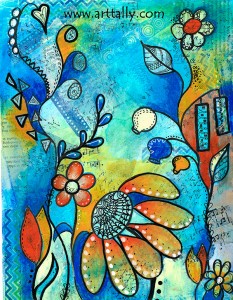 I bet most of the things on your to do list today are useful, important tasks. I bet they are mostly for everyone else. You are planning meals, collecting dry cleaning, meeting your boss’s needs, doing the school run. It’s all good. That’s what we do.
I bet most of the things on your to do list today are useful, important tasks. I bet they are mostly for everyone else. You are planning meals, collecting dry cleaning, meeting your boss’s needs, doing the school run. It’s all good. That’s what we do.
But you need something for you, too. Something just for you, that you do only for fun. Something that doesn’t really matter. Something you are not accountable for. Something you wont be judged on. Something easy, soothing, relaxing. It might even be your secret. But it doesn’t have to be. Like hundreds of chic French women, you might want to get yourself a colouring book.
No, hear me out…. A grown up colouring book. There are more and more of them available. In fact as I write this, the number one bestseller at www.bookdepository.com is Joanna Basford’s Secret Garden. Yes. It’s a colouring book. And guess what number 2 is? Joanna Basford’s orginal colouring book, Enchanted Garden. The top twenty bestselling books at the book depository currently includes no less than 4 adult colouring books.
Think of it as a purposeful activity if you must. A creative kickstart for some, like bestselling author, Joanna Penn. Joanna uses it as a way to get over a creative block and get writing again. It is an easy way to take the pressure off and soothe the muse.
But really, it is therapy. A way to relieve tension and anxiety. It's easier than meditating. Cheaper (and less intrusive) than a counsellor. Sitting down and colouring is pure escapism. It is active meditation. Mindfulness. The world slides by and you hear only the gentle scratch of the pencil tip on the paper. You feel the silky crayon glide satisfyingly over the paper. Glorious colours of your choosing wash the pixels out of your eyes. Who doesn't need a reprieve from those screens?
Remember when you put that first chunky crayon in your toddler’s clumsy fist? We watch our children delight in making marks and relish all that colour. We know it is good for them. That they are playing, learning, growing. As instinctively as they know what to do with the crayon, we know instinctively that we are nurturing them and their creativity. Why do we think we don't need or deserve that anymore?
I would be prepared to bet that you have plenty of juicy art supplies in your house already. You bought them for your children, didn’t you? When you were sitting at that restaurant and whipped out the crayons and paper to entertain your child while your order was prepared, you felt a twinge of longing to join in. A small twinge perhaps… suppressed… but it was there… you know what I am talking about…. You are not the only one - it is exactly how this whole project of mine got started.
So go on - get yourself a colouring book. Raid your kids’ art stash when they are asleep or at school. I can promise it will be fun. You know those scented markers are calling you...
Your life purpose is not that complicated
 Your life purpose is not that complicated, after all.
Your life purpose is not that complicated, after all.
Hundreds of thousands of books have been written on the subject of finding your life purpose. For many of us it is the pursuit of a lifetime. While they say that the unexamined life is not worth living, I am finding that too much examining is not much of life either.
So it is with considerable relief that I stumbled upon some of the most helpful advice I have found so far on a topic I spend a good deal of time pondering. The Teal Swan explains that all of us ultimately have the same life purpose - to find joy. And that to find your ‘passion’ and what you should be doing with your life all you really need to do is follow what brings you joy.
"Find out where joy resides, and give it a voice far beyond singing. For to miss the joy is to miss all" Robert Louis Stevenson
Identifying your life purpose doesn't have to be some grand decision or declaration about the whole of your life. It can be as simple as using this question in order to make the simplest decisions in your every day life. That is information I can use. A structure I can implement. It makes so much more sense to me. Pyramids aren't built in one sweeping gesture, great novels aren't written in a day. They build over time, stone by stone, word by word.
So if you want to know if you are living your life ‘on purpose’, all you need to do is ask yourself ‘what can I do today to bring joy?’. As a guiding principle this really works for me. Trying to identify and articulate your personal values, your passion, your purpose seems daunting. Overwhelming. But when trying to decide whether to say yes or no to an offer you receive, whether to go to place A or place B, asking yourself which alternative brings you joy is much easier to implement. It is also a way to use your intuition. To try to tune in to your own inner voice and figure out what brings YOU joy. Not what you think you should choose, what you have been conditioned to believe is the ‘right’ thing to do. Far easier to do this in each small specific circumstance than to try and identify one grand impressive purpose. One big thing that you are supposed to achieve in your life.
And then slowly, just like each one of those stones in the pyramid or words in the novel, these little choices made by following your joy, show you what your life purpose is. Because life is how we pass each day, not just our grandest achievements. Making the small decisions in line with the guiding principle of what brings you joy will lead you to your grand achievements.
3 problems with following your passions
 |
| Mixed media journal page created in Jane Davenport's online class Create Emotion |
There was a rather annoying woman I used to work with who used to trot about saying irritating things like, " Find a job you love and you will never work a day in your life". Well yes. That is what Confucius said. Clearly no one sets about looking for a job they don't like. Do they? If you have reached one of those flat spots in your life and are wondering how to shake things up a bit, it won't be long before you are advised to 'follow your passions'. If you are considering a career change the advice is usually to think of the things you choose to do in your spare time and consider pursuing those more seriously. In other words, think about your hobbies. What you choose to do as a hobby is what lights your fire, makes your life fun and enjoyable. Hobbies give you a break from the routine. They decrease stress - the bad kind, and promote eustress - the good kind, which gives you enough of a challenge to feel excited about what you are doing. There is the possible sense of accomplishment, without a lot of pressure. The fun is in knitting the beanie with your own two hands... it doesn't really matter if turns out to be hideous, does it? Presumably we are all agreed that work should ideally be fun. Something we enjoy. Something we actually want to do. So making your hobby into your job can only be a good thing. Or can it? I see at least three problems: 1. Making your hobby into work might just be a major passion killer
- what you love to do
- what you are good at
- what someone will pay you to do
Should you... really?
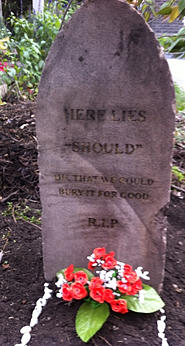 |
| Art Installation 'Here Lies Should' by Robyn deVries |
Sometime ago I was observing, in a conversation with a friend, the things that I thought I should be doing, what I should be content with right now. My friend shook her head.
Right-brain or left-brain?
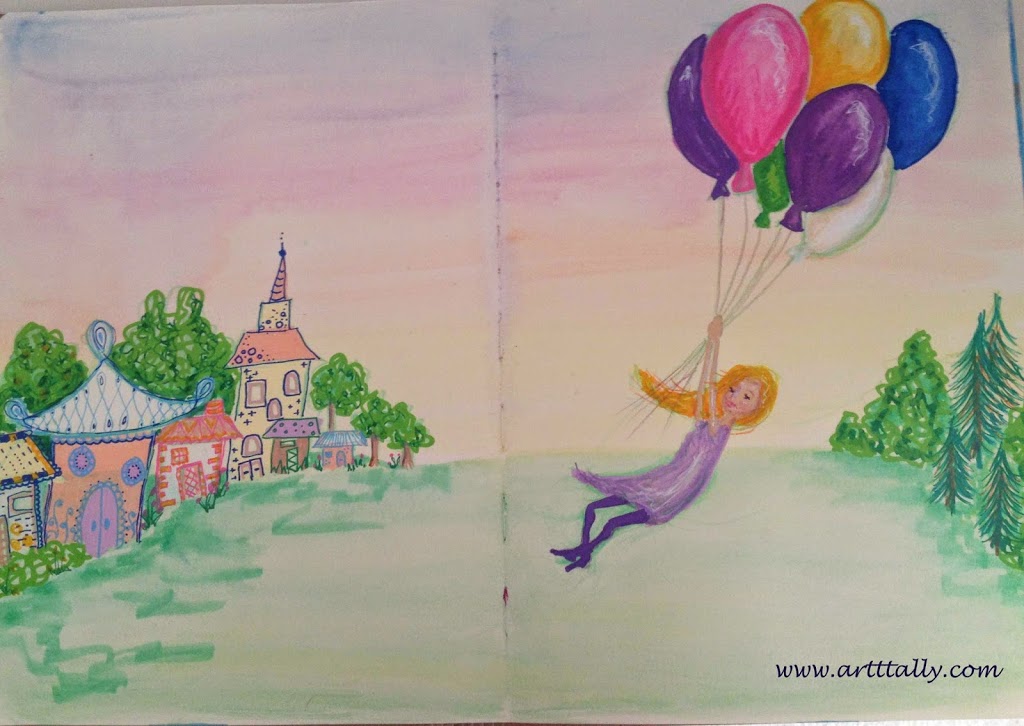 |
| Mixed media 'balloon girl' in my art journal |
I have been attending the right-brain virtual business summit. Being immersed in the world of creative people is rather delightful, but I must admit the whole idea of categorising people as right or left brain, gives me pause.
And as much as I love joining this band of 'right-brainers', I can't help wondering whether I am something of an imposter among them - a right-brain wanna-be. Or is it the opposite, that these creatives are in fact my people and I was never going to be comfortable in a left-brain dominated field? I have spent such a large part of my life utilising logic and analysis quite successfully, so that can't have been a complete misfit, can it?
The answer came from the right brain business summit itself. Like most sensible advice, once I heard it out loud it seems fairly obvious. Melanie Duncan (one of the speakers) said that we should give ourselves permission to be both creative and analytical, and avoid pigeon-holing ourselves.
I think that is the problem with labels. We all love a classification test, whether it is Myers-Briggs personality tests, Cosmopolitan relationship tests or the test to determine which Big Bang Theory character you most resemble. They are fairly irresistible, particularly when you have actual pressing work to do. And of course, they can be helpful in identifying one's strengths and weaknesses, but I think they also run the risk of feeding some of our limiting beliefs. However scientific the tests are, I have a hard time believing that they will all be spot on, all of the time. I would very much like to think that I am a deeply complex being, incapable of being classified. (I think there is a personality type for that.)
In truth, the idea of having one dominant side of the brain is a myth that is now disproved. There is some evidence that better performance comes when both parts of the brain, logical and creative, work together. So far from feeling I have no right to be employing skills from the 'other side' of the brain, I should be embracing them.
If you do not change direction, you may end up where you are heading. Lao Tzu
The cathartic practice of keeping a daily journal
It seems to have been getting increasingly noisy in my head. Every mum probably knows what I mean. I think it is inevitable when you find that, on top of your own, you are keeping every family member's schedule, diet and personal comfort in the back of your mind. Did the kids take their jumpers to school today? Have we eaten way too much red meat this week? Which night did Beloved say he would be late home this week? If you add to all of that the usual mid life crisis stuff like...what is it all for? what is my life purpose? did I really think I would exercise three times this week? shouldn't I have achieved more in my career by now? is this what I really want to do for the rest of my days? ...then what you have in your head is a veritable cacophony.
 |
| Mixed media painting created in the online class 'Lifebook 2014' |
I'm happy to say that I have, quite recently, found something simple which seems to be rather helpful. It is advice that I have seen in various guises from the woo-woo to the scientific. Julia Cameron, in 'The Artist's Way', calls it morning pages, and describes it as "meeting your shadow and taking it out for a cup of coffee". Carrie Barron M.D., in 'The Creativity Cure', calls it 'insight' and the online journal provider Penzu says it is just plain good for you.
Essentially, it is journaling. It is a daily practice of writing out whatever is in your head, in whatever format it tumbles out. No regard for spelling, grammar, punctuation or even good sense. Nor in fact do you need to re-read it. And no one else need look at it either. It is like that thing people sometimes suggest you do to vent your anger at another person, when it is unwise or impossible to do so in person. Have you ever been told to write a letter to someone you feel has wronged or hurt you? To say everything you want to, in whatever language you choose? Usually, the advice is then to destroy the letter. The point is not for it to be a communication device. Carol Tuttle talks about the the healthy, open throat chakra that needs self-expression. Not to be heard, but simply to express itself, to release that energy. I know... if you are not of the incense-burning, yoga and lentil, new age persuasion you were probably rolling your eyes at that.
But believe me it is a strangely cathartic experience. I have been using Penzu, which is contrary to Julia Cameron's advice, that long-hand writing works better, but I find that my typing better matches my speed of thought compared to my lazy handwriting. Somehow, writing out 1000 words per day of this stuff really calms the chattering monkeys in my head. I used to say some of this out loud to long-suffering family members, but I don't think this actually reduced the white noise in my head, and can't have been a great experience for the unsuspecting family member either! However, spewing it out into a journal, probably never to be read again, somehow does help. Once I have jettisoned that inevitable but unnecessary baggage I can actually function again. The feeling of not being able to see the wood for the trees dissipates and I can figure out my priorities for the day. Along the way, the odd good idea pops up.
This, I think, is a good habit I am very pleased to be acquiring. How about you - do you keep a journal?
Observation: fundamental drawing principle and exercise in mindfulness
Disclosure: This post may contain affiliate links. That means if you buy something we may possibly get a very small commission at no extra cost to you, and we thank you.
Cathedral pen sketch following Mark Linley's instructions on buildings in
One of the most important parts of learning to draw is the power to observe. Actually, it is becoming apparent that the best drawings come from spending more time looking at your subject than at looking at your drawing in progress. So important is this skill that some art teachers make you draw without looking at your paper at all. This is fun, obviously, and you end up with some kooky whimsical drawings, but the point is that the better one's power of observation, the better the drawing, regardless of subject.
And that is important I think. In his jolly good book, 'How to draw anything', Mark Linley advises that one should learn to draw everything well and then specialise. Very liberating that would be too... Imagine being able to draw whatever crazy thing pops into your head...
Water mill pen sketch following Mark Linley's instructions on buildings in
However, the thing I probably underestimated is that not only is this good drawing practice but it is also an exercise in mindfulness. In order to carefully study something, to notice the way the light falls, to observe the shapes as they actually appear and not as you think they are, you need to be truly 'present'. Being present in the moment allows you to notice the joyful minutiae of life. If you have ever taken a walk with a three year old, you will know how very many minutes can be happily wiled away engrossed in the examination of every leaf, stick and bug on the pathway. I am finding that drawing is doing much the same thing for me - it can be completely absorbing.
Being present in the moment and delighting in the simple things is what the experts tell us is a pathway to happiness. Mindfulness has been shown to be helpful for stress, anxiety and depression. I'm all for learning to meditate and taking mindfulness training. But, I couldn't be happier at the realisation that it need not be too complicated - that, in fact, a few moments of stillness and calm would seem to be a fairly effortless by-product of the joyful practice of drawing.
Finding your passions
You probably can't come within a mile of a mid-life crisis without hearing that you should be 'finding your passions'. Like much self-help pop psychology this is more broad concept than specific solution. What is it that really lights your fire? Gee, how could you have got this far in life without knowing this?
That emotive word, 'passion' makes you feel somehow deficient for not having, or at least not being able to articulate, something apparently so vital to your well being. It's terribly dramatic, being asked what your passions are, don't you think? What pressure! It seems apt for those of us who are typically boisterous, exuberant, excitable people. But we aren't all like that. 'Passion' probably looks different for different personalities.
And perhaps it is more like your favourite dress. The one about which you say 'I love this dress'. Not 'love' as in the trembling knees, palpitating heart, couldn't-possibly-live-without-it sense, you just mean that you really like it, and feel good in it. That's what we want to find. Something we feel happy doing, something that connects to our authentic selves.
So if you have been searching for your 'life purpose', your 'passions' to no avail, maybe you should give yourself a break. Maybe it's those grandiose terms that are misleading and just a little scary. Let's give it another label. Ken Robinson has a better suggestion. (Yes, I know I have written about Ken before, but he makes a lot of sense!) His counsel is to 'find your element'... now that seems much more approachable, doesn't it?
The Fertile Void
"How are you?" asks Wise Friend, a fellow mum, at school pickup.
Erm...I know this is not supposed to be a difficult question. A myriad of one-word answers burst like bubbles in my head. Confused. Elated. Panicked. Insane. Fuzzy. I blurt out, "I just applied for a career break. So..... I'm not sure.... I cant really tell up from down at the moment..."
"Oh, that's brilliant!" says Wise Friend.
"Is it...?" I smile weakly, hoping my eyes aren't looking too manic.
"Yes", she says, "you're in the fertile void - its a great place to be."
The chattering monkeys in my head hush for awhile. They seem to be thinking about this. Their momentary silence is quite refreshing. The Fertile Void... its a Thing. Its amazing how comforting a label can be. No longer am I in limbo - I'm not flotsam being buffeted about in a swirling mass of uncertainty. In fact, I'm in the fertile void, a place of infinite possibility.
As I reflect on the impact of this more positive re-framing of my choice, I realise how much weight I have accorded the various titles or labels I have assumed with each job I have undertaken.
I started out on a 'sensible' career path in part to appease my parents and in part because of the absence of any obvious life-purpose (which I think seems fair enough at age 18). Stepping onto that path is more like stepping onto a treadmill or a conveyor belt. You are on your way to becoming a.... (insert label here). You must be successful if you are now a ..... (insert label here). When people ask, 'what do you do?', you have a glib, instant answer, "Oh, I'm a .... (insert label here)"
And there you are, before you know it, you are what you do. Part of your self worth is attached to the institution that employs you. How curious, if this was not something that you necessarily chose, consciously, all those years ago....
So, absent this affiliation to the lofty institution to whom I have given my most recent ten years of service, who am I, I wonder?
What a fascinating question to explore.
And how lucky I am to have the opportunity to do so.
"Leap, and the net will appear" John Burroughs


